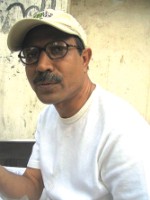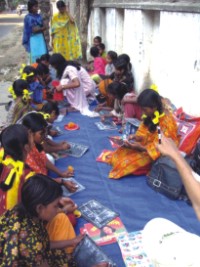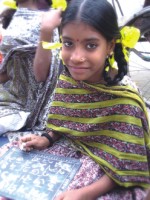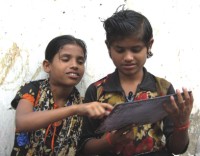| Endeavour
Under Open Skies
Andrew Morris
 |
Rezaul Karim--making a difference to poor children. |
There is no question that when you look around in downtown Dhaka, among the high-rises and the opaque glass palaces of the corporations, past the shining adverts and powerful cars, there is always a fair amount of suffering on display. Into these gaps fall the destitute, the lame, the old, the sightless and the hard-bitten kids who have learnt to survive, at the age of 8, on the harsh streets. And when faced with these Gap People, you can react in so many different ways. You can indulge in warm syrupy feelings of pity, salve your consciences by distributing a few taka here and there, or pretend it isn't happening by blocking it out and concentrating extra hard on your newspaper.
Alternatively, you can start to do something to make a real change. This is no doubt the most arduous and demanding of all responses, but certainly the most rewarding too. Rezaul Karim is someone who has taken up that challenge with a vengeance, and who is making a difference to the lives of some of the most disadvantaged people in the country.
If you wander the streets of Gulshan between three and five each afternoon, past the bougainvillea-clad villas, the elegant gates, the garages with their 4x4s, you may chance on an arresting sight: a group of about twenty children sitting in neat rows on a long blanket on the pavement. They have colouring books and pens, slates and chalk, and they work with quiet determination on their lessons, whether of Bangla, math, sewing, arts, crafts and even English, seven days a week. Welcome to the Open-Sky School, run by Mr Karim, 58, who introduces himself as “Khokon” (“Little Boy”), and his assistant teacher Sonia Nazmun Nahar, 20, a dynamic young social worker. Together they are running a very impressive venture indeed.
 |
Lesson in progress. |
I arrive for my appointment with Khokon ahead of time, and am at once surrounded by a group of children. Confident and articulate, they are immediately at ease, and offer a saffron flower as a welcome gift. Even before their teacher gets here the older girls have begun to organise and take responsibility for the younger ones: one 17- year-old proudly declares herself the “class captain”. But when Khokon arrives in his immaculate white t-shirt, jeans and baseball-cap, they take up their positions for the start of the lesson, ready for business. As the class continues, there is a disciplined and industrious atmosphere. Heads down, the children concentrate on their slates, inscribing letters of the alphabet in both Bangla and English, and holding them up proudly for inspection.
Originally moved and motivated by his post-war experiences in the early 70s in the flood-prone islands of the South, where he saw what can suddenly befall people who become landless overnight and are forced to migrate to the city, Khokon began to open schools like this in his own district of Sirajganj four years ago. There are now six such schools there, and a further two in Dhaka: one in Gulshan and one near the Sheraton. He plans to gradually expand the number of schools, and his ultimate vision is of a residential village catering to the disadvantaged, both old and young alike.
Scouring the streets for these children, who are usually engaged in collecting bits of metal and scrap for sale, Khokon initially carried out a two-month motivation campaign, trying to convince the kids he came across, of the value of literacy and basic education. News soon spread through word-of-mouth, and these days attendance, although completely voluntary, is regular, as the neatly-kept register demonstrates. In addition to their core curriculum the young learners receive moral education both through storybooks and spoken anecdotes describing the dangers of taking drugs, smoking and chewing tobacco.
 |
Learning to read and write. |
The vast majority of the students are girls, with bright yellow ribbons tied in their hair. It's evident from their slightly careworn, knowing faces and their streetwise self-confidence that these kids have already seen more of the underside of life than any child should, but there is an energy and joyful determination to them which stops any possibility of a sentimental reaction in its tracks. These kids are tough survivors, and they know exactly why they are here.
“I want to learn to read and write,” says Rakha, 17. “So that I can have better opportunities.” Mala, 10, chimes in with “I want to be a teacher.” Meanwhile, Seema, 13 has set her sights on being a doctor, and Akhi, 12, wants to work in garments. They know that the two hours spent here mean less earning time, and that is no small thing, but they make this choice willingly.
So why, one might ask, are they not in a regular school? The simple truth is that their parents, if they have any, are so poor that in many cases they depend on the meagre income these kids can scrabble together. In some cases, the parents themselves need convincing even of the value of this afternoon class, although during my hour at the school, a new mother turns up nervously with her child, clearly anxious to help her avoid the life of penury she herself has experienced. Many of their homes have been abandoned by fathers who have opted for younger wives in unregistered second marriages. There are some who simply have no homes, and live on the streets. One child is an orphan and looks after her ailing grandmother. Another says her mother has heart disease, while a third explains matter-of-factly how her mother is blind and housebound.
 |
A joint venture. |
The children have already learnt that life is a struggle in many ways. Belonging to the underclass in a society which has arguably still not rid itself of the ancient idea of caste, despite the explicit egalitarianism of Islam, the odds are stacked against them from the beginning. But they know equally that the literacy, numeracy and basic skills offered by the Open Sky School can offer them a passport out of this cycle of poverty. This is their only hope, and they cling to it tenaciously. They are evidently inspired by Khokon: a man who believes in meeting challenges head on, and by Sonia whose independence of spirit and self-assurance is a positive example to these girls of what they can aim for. When asked what her family and friends think of her involvement in this work, she meets my eye with a level gaze and says she doesn't care what anyone else thinks: this is what she wants to do.
Khokon accepts no financial donations for his work, asking: “Why should we beg? Can we not provide for our own requirements?” Well-wishers have occasionally offered books and food, which have been accepted gratefully. A Japanese supporter arrives frequently to help out with the class. But this is not a venture which depends on charity: it meets all its needs by itself. Indeed, Khokon is scathing about the priorities of many NGOs. ”I prefer to call this an NPO” (Not-for-profit organisation). “What do I need with a logo, an air-conditioned office and a Landcruiser?”
Copyright
(R) thedailystar.net 2007 |
|
